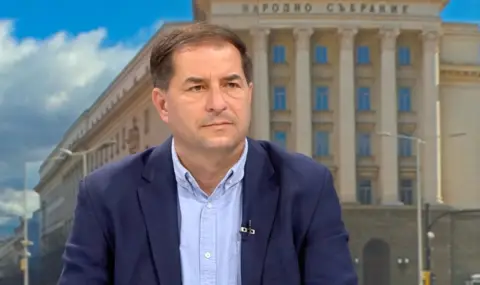The Supreme Judicial Council must follow the agenda prescribed by the Constitution , from the laws, not the party calendar and party conflicts. It stated in "Speak Now" the Associate Professor of Constitutional Law – Borislav Tsekov.
On the eve of the next parliamentary elections, this week President Rumen Radev called on the parties to say how they will fight corruption at the highest levels of power. The leader of GERB, Boyko Borisov, asked for a gentleman's agreement, and the leader of "We continue the change" - Asen Vassilev insisted on the rapid adoption of the anti-corruption laws so that the money from the Recovery Plan would come. Against this background, the prosecutor's collegium at the Supreme Judicial Council, whose members have expired, decided to start a procedure for the election of a new chief prosecutor.
"The most important thing that the politicians do not do is to take adequate political, legislative, parliamentary, governmental measures so that all these stories that we have listened to in recent years can be realized. And now again, an election campaign and the same stories from the same people. Let's see if, in the foreseeable future, Bulgaria will restore the political dialogue and the communication between the parties will normalize. This does not mean some unprincipled agreement, it means a normal political dialogue, taking into account the vote of the voters and from there searching for a solution. And the only useful solution for Bulgaria and for any normal country is to reach an agreement on the formation of a government and some priorities. They haven't been doing this for years and it's everyone's fault. Not only the parties, but also the institutional factors", the docent of constitutional law is categorical – Borislav Tsekov.
"Even when they were in a coalition, PP-DB, GERB and DPS had a whole constitutional majority, they still did not lift a finger, precisely because the normal functioning of political life was disrupted," said the associate professor.
"The Supreme Judicial Council is the current Supreme Judicial Council. The fact that the mandate has expired in no way prevents and should not prevent the normal functioning of any higher constitutional institution, because the principle of continuity of government operates, unless there is some express norm that says - no, on the day and the minute the mandate expires, they cease to operate. But the Supreme Judicial Council is not such a body, it acts."
According to him, the saga with the expired mandate of the SJC is once again the fault of the parliament.
"The fault here is again in the parliament, respectively, of course, to some extent in the judiciary, as far as their quota, although elected, it hung in the air, because of the parliamentary inaction. So we should not blame that the Supreme Judicial Council fulfills its constitutional duties, functions and competences."
"There is no constitutional impediment, as has been asserted here and there, although this is an opinion which is not shared by the general body of jurists who understand something of this matter. The authoritative opinion is that there is no obstacle in its current composition of the SJC to elect both the chief prosecutor and the president of the Supreme Administrative Court, because those transitional provisions that were voted in the Law on Amendments and Supplements to the Constitution, those failed constitutional changes that the Constitutional Court declared invalid, and which contain a ban on these two bodies, which should have been independent - the Supreme Judicial Council and the Supreme Prosecutor's Council, remained without subject.
In this sense, it is not necessary, as some imagine, explicitly, either the Constitutional Court or the Parliament to cancel this paragraph 22-23 of the amending law of the Constitution, which provide for four things, there are four paragraphs and each of them provided in the hypothesis that constitutional changes take effect, how the consequences of these changes will be settled. They predicted first that it should be accepted within a certain period of time to have legislation to deploy and develop the changes. The other three paragraphs are without subject, as the Constitutional Court declared the changes invalid," explained Prof. Tsekov.
